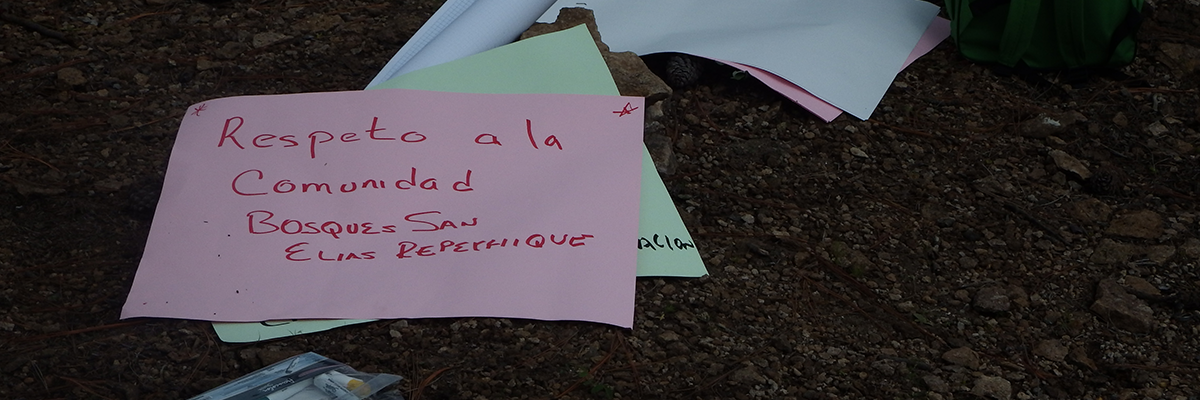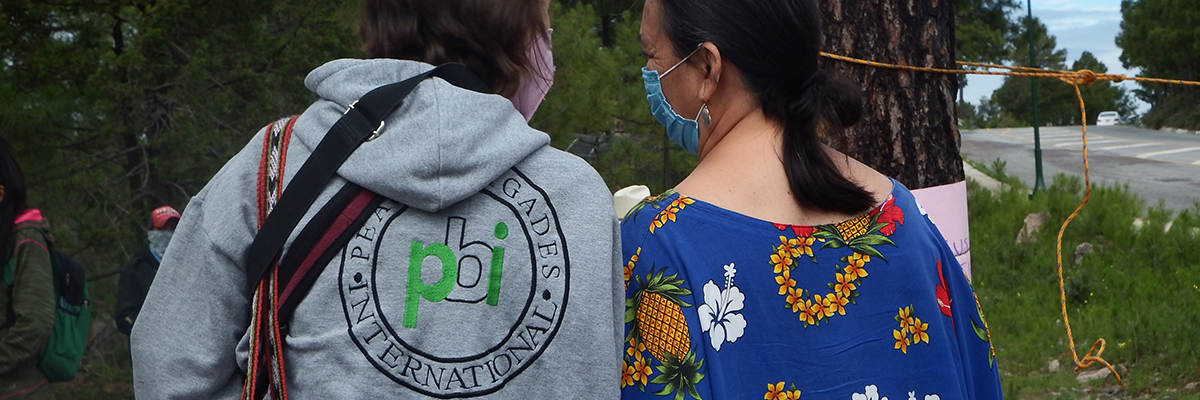For over 20 years, Community Technical Consultancy, A.C. – CONTEC has worked with indigenous communities in Sierra Tarahumara, which have been denouncing abuses related to the exploitation of their lands and natural resources. The extremely violent context affecting these communities is an issue which is acknowledged by national and international institutions and puts local human rights defenders on high risk. Due to their work in defense of human rights, both community members as well as CONTEC, have suffered retaliation. PBI has dully accompanied CONTEC since 2015; in February 2022 PBI has amplified and formalized their accompaniment due to the increased risk level facing the organization.

The work of CONTEC
Community Technical Consultancy, A.C. – CONTEC is a non profit organization, legally constituted as a civil society association since 1999. Their goal is to promote a peasant economy and governance in indigenous communities and forest commons in Sierra Tarahumara in the state of Chihuahua, through capacity building, technical advisory services and the defense of community rights.
This organization, headquartered in the city of Chihuahua, currently accompanies a total of 6 communities rooted in the municipalities of Bocoyna, Carichí, Guadalupe y Calvo, Urique, San Rafael and the displaced communities of “El Manzano”, originally of Uruachi municipality and “Monterde” of the Guazapares municipality, the members of which find themselves in forced internal displacement.
These communities face issues related to land and natural resource appropriation and violence against its members, lack of institutions and forced displacement. The main causes of these issues are related to economic interests surrounding tourism projects, legal and illegal exploitation of forests, real estate and energy projects such as mining, pipelines and the presence of organized crime.
CONTEC has lead over 20 lawsuits related to the rights to land, consultation and preferential use of natural resources, the free and autonomous determination of a peoples, arrest warrants as well as omission in the acknowledgement of the condition of internally displaced, a work which has set legal precedents at the state and national levels. Two cases stand out amongst them, which have been accepted by the Interamerican Court of Human Rights (IACHR); one of which requested protective measures for the displaced community of “El Manzano” in 2015; and the other followed a collective complaint by three communities against the Tourist Project “Barrancas del Cobre” for which there was no free, prior, informed consultation and community consent.
The organization, besides legally accompanying and empowering indigenous communities to knowing and demanding their rights, promotes technical advisory services in topics related to land use planning, energy-saving projects, forest soil conservation, territorial ordering and drinking water. Furthermore, they offer advisory services and workshops on accompaniment to community processes in gender equality, health, youth and infancy. Additionally, CONTEC has a research and publication line regarding the context of Sierra Tarahumara.
Violence in la Sierra Tarahumara
Sierra Tarahumara, located in the State of Chihuahua, is home to 90% of the State’s indigenous population, and is characterized, according to several press and activist reports, by their context of violence.
Many communities find themselves forced to move away out of fear of organized crime present in their territory and of their executions, threats and forced recruitment in opiate fields. In 2014, CONTEC was part of the Caravan for Justice in Sierra Tarahumara, an initiative retaken in 2015 with the goal of evidencing the violence faced by communities before the Governance Secretariat and the Senate of the Republic.
The context of violence in Sierra Tarahumara entails an elevated risk for human rights defenders working in the region. This situation has also been evidenced by the IACHR in their report on the Situation of Human Rights in Mexico (2016), in which they confirm they “received information regarding the situation of violence faced by human rights defenders and indigenous leaders, including those who are beneficiaries of preventive measures by the State of Chihuahua”.

Risk situation of CONTEC
Defending human rights in the state of Chihuahua entails an elevated risk for many defenders. This aspect was highlighted by Chihuahua’s civil society when, at the beginning of April 2016, a claim was made to the Human Rights Undersecretariat of the Governance Secretariat, requesting the publication of “an early alert preventing future aggressions on human rights defenders in Chihuahua”. Precisely, members of CONTEC have reported instances of harassment, intimidation and defamation campaigns for their legitimate work of defending human rights.
Support Networks
CONTEC has made ties with local and national sister organizations, as well as communities with shared issues; along with Alianza Sierra Madre A.C., Awé Tibuamé, the Capacity Building and Human and Indigenous Rights Defense Center A.C., they are one of the conforming members of the Network in Defense of Indigenous Territories of Sierra Tarahumara (REDETI), and they are also part of the Serrana Network. Furthermore, CONTEC is part of the National Network of Civil Organisms of Human Rights, All Rights for All (Red TdT) and Network of Human Rights Defenders.
Relationship with PBI
CONTEC and PBI have crossed paths since 2013 in several civil society spaces in Chihuahua, working closer together from 2014, the year in which CONTEC requested advocacy workshops as well as capacity building support in security and protection, which were given in 2015, 2018 and 2019. Starting in 2022, PBI formally accompanies the organization, and brings physical accompaniment, advisory services in advocacy, security and protection, and positions their issues and expresses worry over the safety of human rights defenders accompanying communities in Sierra Tarahumara before federal and state authorities and international actors.
Website, Facebook, Twitter, Website of Red de Defensa de la Tarahumara

